In recent years, social media marketing for restaurants has transformed the way eateries market themselves, engage with customers, and showcase their culinary offerings.
A study by MGH, a full-service restaurant marketing agency revealed that around 45% of diners choose a restaurant based on its social media presence.
Moreover, 22% of consumers are more likely to visit a restaurant if they’re influenced by positive comments or reviews on social media platforms.
In this article, we’ll unravel how you can leverage restaurants’ social media marketing. Without any further ado, let’s dive right in!
Benefits of a Strong Social Media Presence for Restaurants
The significance of restaurants’ social media marketing extends far beyond just a platform for sharing captivating food photos or showcasing the ambiance.
It is a dynamic tool that transforms how eateries connect with their audience to drive business growth in the following ways:
- Establishing a strong presence across platforms like Instagram, Facebook, Twitter, and others expands the restaurant’s reach, making it more accessible to potential diners and increasing brand recognition.
- Social media fosters engagement and interaction by encouraging conversations, sharing user-generated content, running polls or contests, and providing behind-the-scenes glimpses, thereby forging a deeper connection with the audience.
- Restaurants can exhibit their culinary creativity, expertise, and unique offerings through visually appealing content, compelling storytelling, and showcasing the team’s passion for food.
- A well-executed social media strategy can translate into tangible results, driving increased foot traffic, and reservations, and ultimately boosting revenue.
- Platforms like Facebook offer spaces for diners to leave reviews, allowing restaurants to address feedback, demonstrate responsiveness, and build a positive online reputation.
Choosing the Right Social Media Platforms
Social media consists of a multitude of platforms, each with its unique features and audience demographics.
For restaurants aiming to thrive on social media, selecting the right platforms is as crucial as choosing the perfect ingredients for a signature dish.

Here’s an analysis of popular social media platforms for restaurant marketing:
Instagram – Visual Feast for Food Enthusiasts
Known for its visually-driven content, Instagram is a haven for showcasing appetizing food photos and engaging visuals.
Its focus on aesthetics and storytelling makes it ideal for restaurants looking to entice viewers with tantalizing dishes, ambiance, and behind-the-scenes glimpses.
Facebook – Robust Community Engagement
With its extensive user base and versatile features, Facebook provides restaurants with a comprehensive platform for community engagement.
From sharing updates, events, promotions to responding to reviews and fostering dialogue, it’s a versatile space for attracting and building a loyal customer base.
X – Real-time Engagement and Conversations
X’s fast-paced nature and succinct messaging offer opportunities for restaurants to engage in real-time conversations, share quick updates, address queries, and showcase their brand personality through witty, concise content.
TikTok – Creative and Engaging Short-form Videos
TikTok’s popularity has surged, especially among younger demographics.
Restaurants can leverage their creative potential by crafting engaging short-form videos showcasing culinary skills, unique recipes, or fun behind-the-scenes moments to capture the attention of a younger audience.
Crafting Compelling Content for Restaurant Marketing
Imagine this: a captivating Instagram post featuring a sizzling dish, perfectly plated and garnished, shared by your favorite local eatery.
Or perhaps a Facebook Live session revealing the chef’s culinary techniques, streamed directly from the kitchen.
Far more interesting than a plain picture of a menu or signature dish, isn’t it? This is why the art of crafting compelling content holds immense significance.
Nonetheless, leveraging social media for restaurant businesses isn’t merely a trend; it’s an essential strategy.
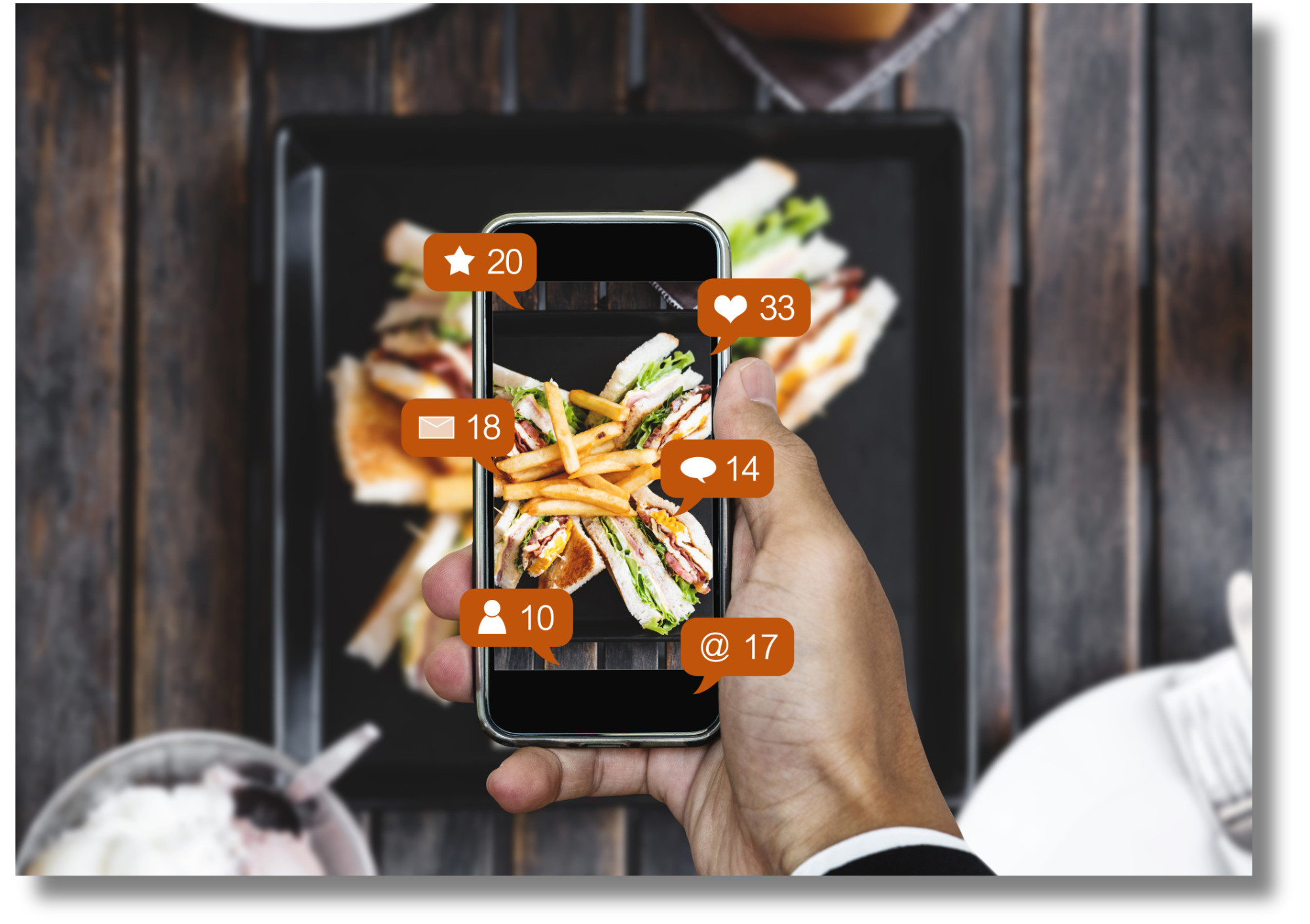
Here are a few different types of content that resonate well with audiences when considering social media for restaurants:
Stunning Food Photography
High-quality, visually appetizing images of dishes take center stage is restaurants’ social media marketing. As per a new survey by MGH, 36% of consumers have been discouraged from visiting a restaurant because of unappealing food photography.
Hence, it is crucial to showcase the artistry of culinary creations, appealing presentations, and close-up shots that evoke cravings.
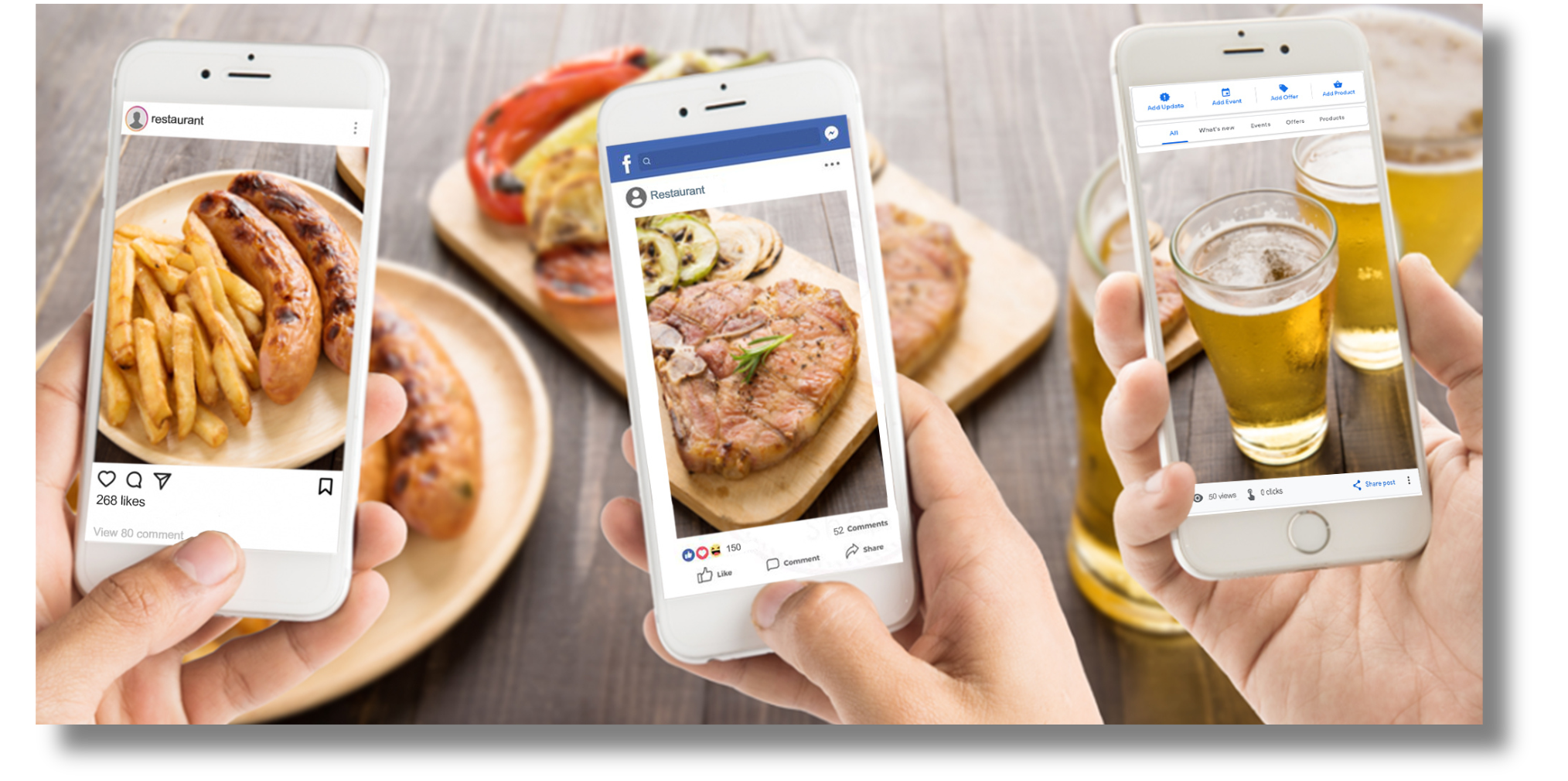
Behind-the-Scenes Glimpses
Offer a sneak peek into the kitchen, the chef’s expertise, and the restaurant’s inner workings. Authentic behind-the-scenes content adds depth and humanizes the dining experience. Post images that capture the unique concepts of your restaurant, such as a creatively designed tip jar for larger tips, adding an emotional touch that resonates with your customers. For a modern touch, consider showcasing a restaurant or coffee shop digital menu board to highlight your diverse beverage offerings and create an engaging visual experience for patrons.
Engaging Videos
Engage viewers with visually appealing videos showcasing recipes, chef demonstrations, restaurant ambiance, or customer testimonials. Short, engaging videos or reels can captivate attention and convey messages effectively.
User-Generated Content (UGC)
Encourage patrons to share their experiences by reposting their content, such as food photos or reviews. UGC not only fosters a sense of community but also acts as an authentic endorsement.
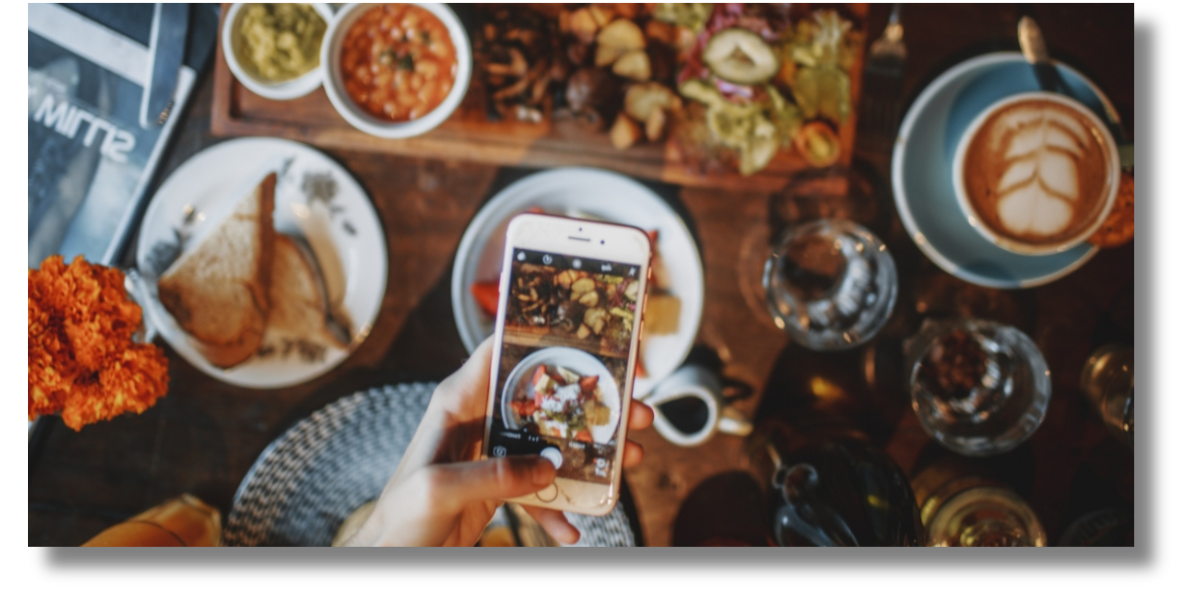
Tips for Creating Captivating Content
By curating content that resonates with the target audience, restaurants’ social media marketing can create a compelling digital narrative that entices and engages potential customers.
Thus, to successfully drive foodies from scrolling through a feed to savoring a meal at your restaurant, you need to create content that ticks the following boxes:
- Invest in high-quality visuals. Use good lighting, experiment with angles, and focus on presentation to make food and ambiance visually appealing.
- Use storytelling to convey the restaurant’s narrative, showcase its history, highlight the chef’s expertise, or share the journey behind signature dishes.
- Engage audiences through interactive polls, quizzes, or challenges related to food preferences, local cuisine, or restaurant trivia.
- Maintain a consistent posting schedule while offering diverse content. Mix food shots with behind-the-scenes glimpses, customer testimonials, and promotional updates for a balanced feed.
- Stay updated with current trends, seasonal offerings, or holidays. Tailor content to resonate with specific themes or occasions relevant to your restaurant.
- Encourage engagement by including clear CTAs in posts, and inviting users to comment, share, participate in contests, or tag friends.
Tips To Gain Organic Follower Growth
Primarily, social media platforms are virtual storefronts. When you are leveraging social media for restaurants, it serves as the digital billboard where delectable dishes are spotlighted, ambiance is conveyed through imagery, and compelling narratives about the culinary journey are woven.
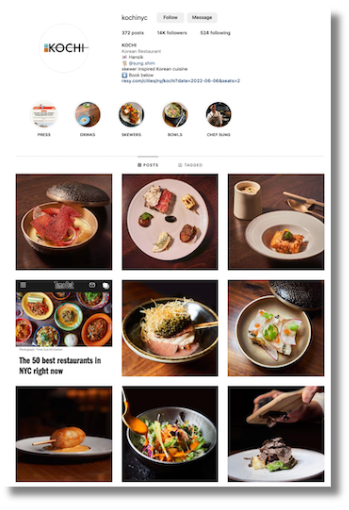
Moreover, by actively engaging with the audience, implementing strategies that foster interaction, and curating content that resonates with followers, restaurants can cultivate a loyal following and foster a thriving online community.
Take a look at how you can boost organic following through restaurant social media marketing:
Consistent, Quality Content
Deliver engaging and valuable content consistently. Quality content encourages followers to share and recommend your restaurant to their networks, organically expanding your reach.
Utilize Hashtags and Geotags
Leverage relevant and trending hashtags, as well as geotags, to increase discoverability. This aids in reaching potential customers interested in local dining experiences.
Cross-Promotion and Collaborations
Collaborate with local businesses, food bloggers, or other establishments to cross-promote each other’s content. This mutually beneficial strategy exposes your restaurant to new audiences.
Encourage User-Generated Content
Encourage your customers to share their experiences and content related to the restaurant.
User-generated content not only fosters engagement but also acts as an authentic endorsement that not only amplifies reach but also builds a community around your brand.
Active Engagement
Promptly respond to comments, messages, and reviews. Engage in meaningful conversations, acknowledge feedback, and express gratitude to create a sense of rapport with the audience.
Contests and Giveaways
Run interactive contests or giveaways that encourage participation. Whether it’s a photo contest featuring patrons enjoying meals or a giveaway for a dining experience, these initiatives ignite excitement and drive engagement.
Collaborating with Influencers
Partner with influencers or food bloggers whose audience aligns with your target demographic. Their endorsement through reviews, posts, or collaborations can amplify reach and credibility.
Leveraging Social Media Advertising for Restaurants
To amplify visibility, reach a larger audience, and drive tangible results, using social media for restaurant advertising is a smart investment.
Paid advertising on social media platforms offers restaurants a targeted and measurable way to expand their reach and engage with potential diners.
It allows precise audience targeting based on demographics, interests, behaviors, and location, maximizing the impact of promotional efforts.
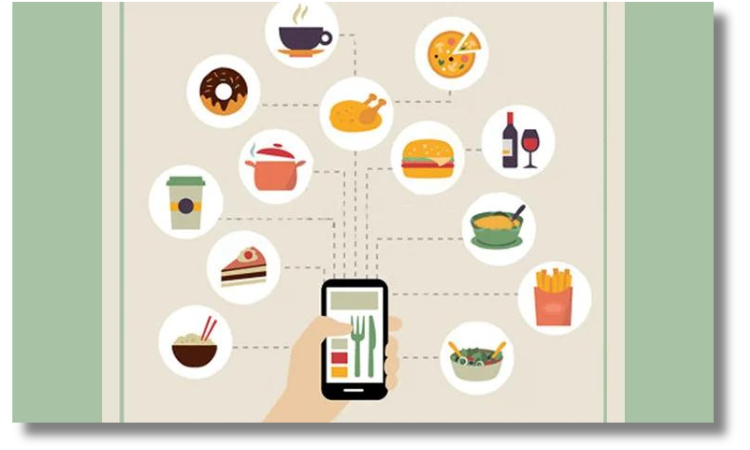
Furthermore, by investing in boosting posts and paid ads, restaurants can strategically position themselves in front of a specific audience segment, increase brand awareness, and promote special offers or events. Additionally, this can also drive traffic to their physical locations or websites.
Best Practices for Restaurants Social Media Marketing
Consistent engagement, high-quality content, and a strategic approach are pivotal in establishing an impactful social media presence. If you want to ensure impactful restaurant social media marketing, implement these best practices:
Create a Content Calendar
Plan and schedule posts in advance using tools like the SocialBu content calendar that enables you to create and schedule all your posts conveniently. Ensure diversity in content to keep the audience engaged and informed.
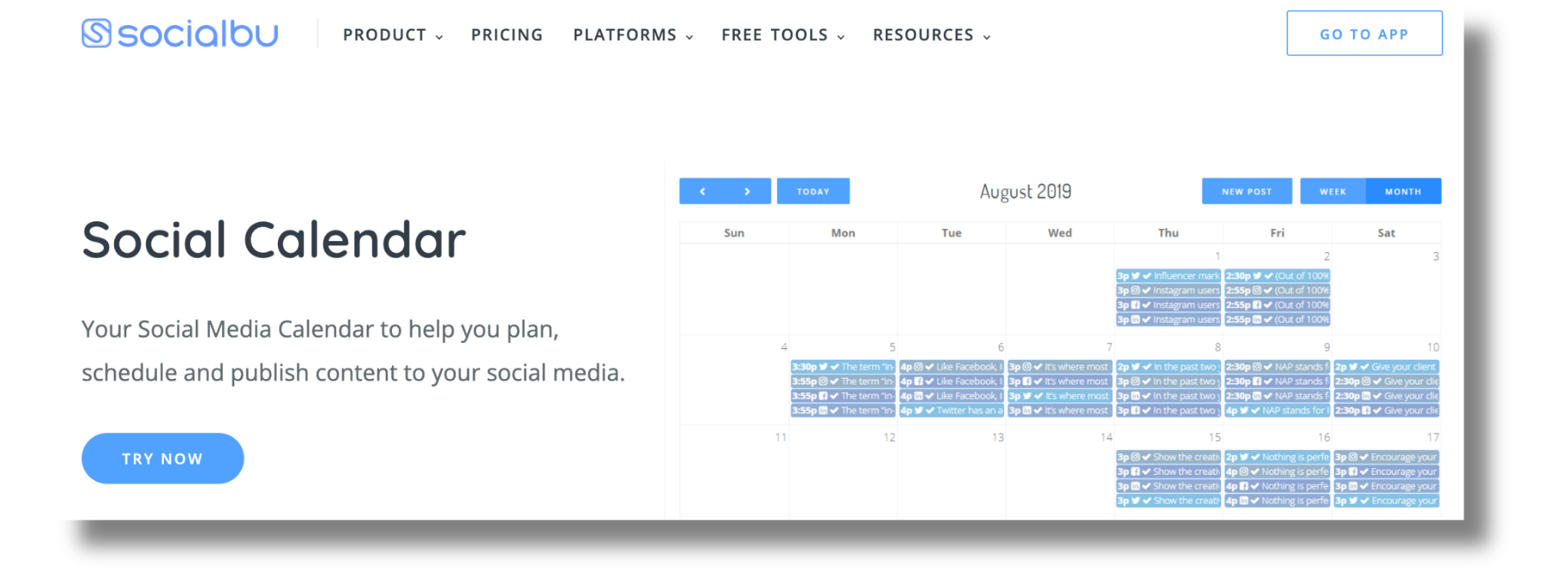
Consistent Branding
Maintain consistent branding elements across platforms. This includes visual aesthetics, tone of voice, and messaging to reinforce brand identity.
Authenticity and Transparency
Be genuine in your interactions and content. Share authentic stories, behind-the-scenes glimpses, and transparent information to build trust with your audience.
Continuous Learning and Adaptation
Stay updated with social media trends and platform changes. Adapt strategies based on evolving algorithms and audience preferences to stay relevant.
Monitor Competitors
Keep an eye on competitors’ social media activities to gain insights and inspiration. Analyze their successful strategies and tailor them to fit your restaurant’s approach.
Conclusion
All in all, restaurants’ social media marketing is a dynamic engine driving customer engagement, brand perception, and revenue growth.
Moreover, a well-crafted social media strategy acts as a bridge that connects restaurants with their audience, enabling them to showcase their culinary expertise, ambiance, and brand personality.
Remember, when establishing ground for restaurant social media marketing, you are creating a space for dialogue, feedback, and building relationships beyond the physical dining experience.
Besides, by actively participating in these conversations, you can gain insights into customer preferences, address concerns swiftly, and cultivate a loyal customer base around your culinary offerings.
FAQs
How can social media benefit my restaurant’s marketing strategy?
Social media provides a powerful platform to showcase your restaurant’s ambiance, menu offerings, and promotions, and engage directly with customers. It helps in building brand awareness, fostering customer relationships, and driving foot traffic.
Which social media platforms are most effective for promoting restaurants?
Platforms like Instagram, Facebook, Twitter, and Pinterest are popular for restaurant marketing due to their visual nature and engagement opportunities. Choose platforms based on your target audience and content style.
What type of content should I post on social media to engage my audience?
Engaging content includes high-quality food photos/videos, behind-the-scenes glimpses, customer testimonials, special offers, contests, and interactive posts like polls or quizzes related to food preferences.
How often should I post on social media for optimal engagement without overwhelming my audience?
Aim for consistency but avoid overposting. Posting 3-5 times a week on each platform can maintain engagement without overwhelming your audience. Adjust frequency based on audience response.
What are some effective ways to increase engagement and followers on social media for restaurants?
Engage with your audience by responding to comments/messages, collaborating with influencers, running contests/giveaways, sharing user-generated content, and using relevant hashtags.
Is it necessary to invest in paid advertising on social media for restaurant marketing?
While organic content is valuable, investing in targeted paid advertising can significantly amplify reach and visibility, especially when promoting special events, new menu items, or exclusive offers.
What are some common mistakes to avoid when using social media for restaurant marketing?
Avoid inconsistent posting, neglecting engagement with followers, posting poor-quality visuals, ignoring negative feedback, overusing sales pitches, and not leveraging analytics to refine strategies.







